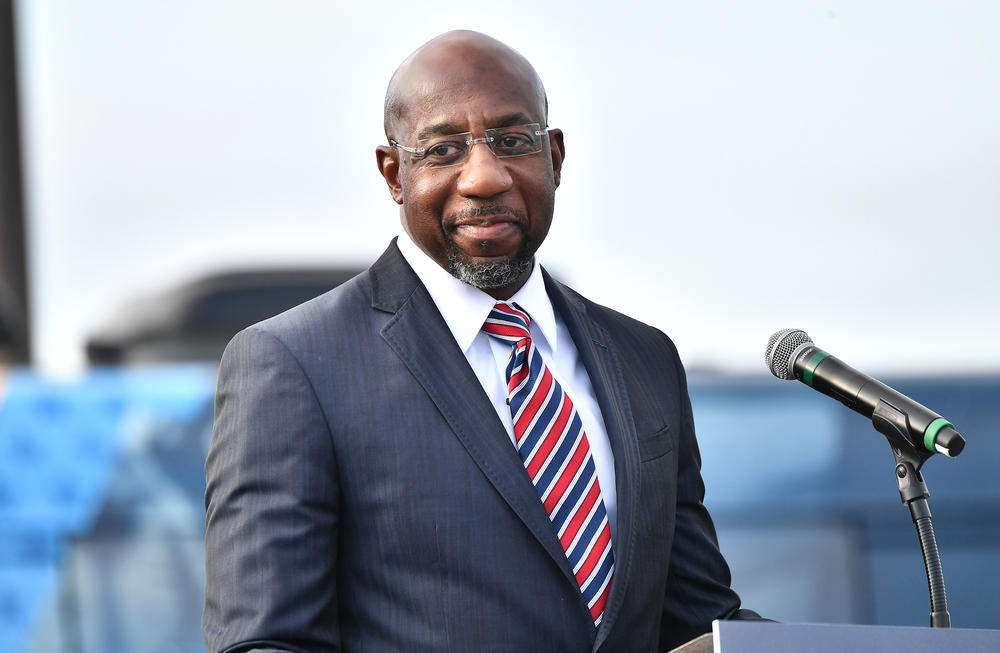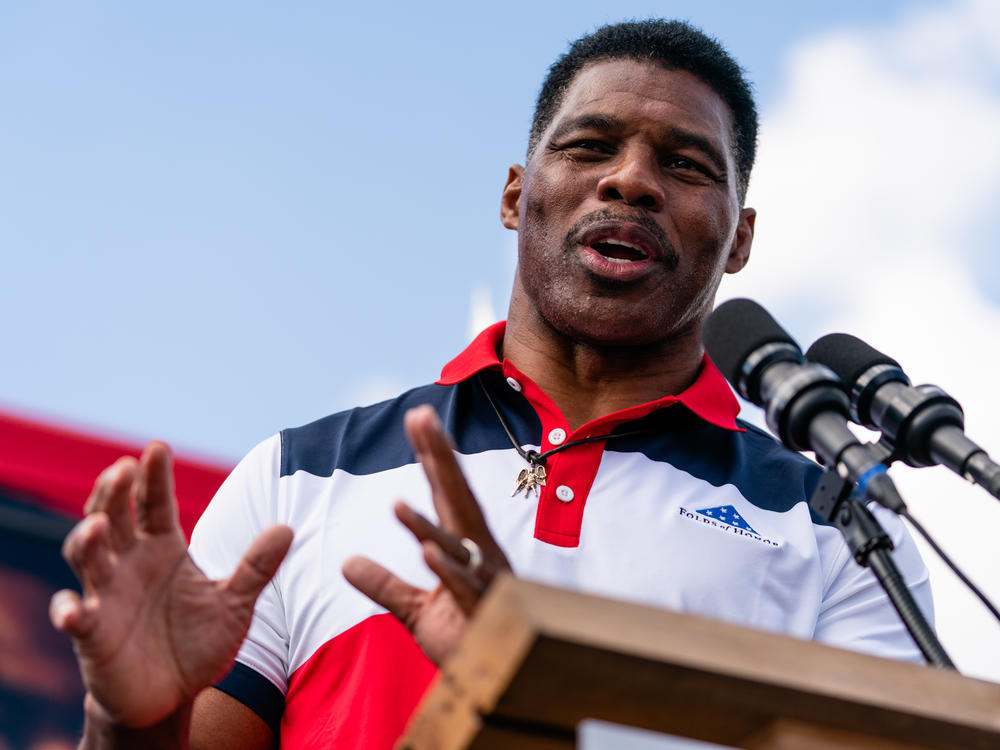Section Branding
Header Content
Sen. Raphael Warnock and Herschel Walker are going to a runoff in Georgia
Primary Content
Follow live updates and results from Election Day 2022 here.
Georgia again is key to control of the U.S. Senate, as incumbent Democratic Sen. Raphael Warnock and Republican Herschel Walker are heading into a Dec. 6 runoff.
With more than 3.9 million votes reported and more left to count, neither candidate was above the 50% threshold needed to win outright under Georgia law. This sets up a post-Thanksgiving showdown in what is already the country's most expensive Senate race.
Speaking to supporters just before 2 a.m. on Wednesday, Warnock sounded optimistic about his chances to prevail in the coming weeks.
"Here's where we are: We are not sure if this journey is over tonight, or if there's still a little work yet to do," he said. "But here's what we do know: We know that when they're finished counting the votes from today's election that we're going to have received more votes than my opponent."
Late Tuesday evening, Walker also expressed his confidence in the final outcome, comparing himself to the main character in the Will Ferrell comedy movie Talladega Nights.
"I'm telling you right now, I'm like Ricky Bobby," he said. "I don't come to lose."
Georgia's Senate race is the lone bright spot for Democrats, after Gov. Brian Kemp, Secretary of State Brad Raffensperger and the rest of the Republican slate notched commanding victories over Democratic challengers in a state that more recently saw narrow margins.
Early returns show Walker struggled with Republican support. He earned about 200,000 votes fewer than Kemp, trailing the governor's margin by close to double digits in some GOP strongholds and nearly five points overall.
In the closely-divided battleground state, more voters supported Warnock but he failed to clear the 50% needed to win outright.
Warnock, pastor of the historic Ebenezer Baptist Church in Atlanta, won a special election runoff in 2021 to fill the final two years of the late Republican Sen. Johnny Isakson's term after his retirement in 2019.
His pitch to voters was heavy on accomplishments during his brief time in office, touting legislation that lowered health care costs for senior citizens and painting himself as a champion of bipartisan problem solving in a gridlocked Congress. On the campaign trail, he frequently invoked partnerships with Republicans like Texas Sen. Ted Cruz and Alabama Sen. Tommy Tuberville.
"I will work with anybody if it helps me to get something done that's good for Georgia," Warnock said at the Democratic Party of Georgia's state convention in September.
Warnock found success by mobilizing a coalition of voters in an electorate that has rapidly grown and diversified in recent years, but also through a sizable number of Republicans who said they would not support Walker's controversial campaign.
In pre-election interviews and public polling, as many as one in 10 GOP voters in Georgia said they would either vote for Warnock, cast a protest vote for Libertarian Chase Oliver or leave the race blank instead of vote for Walker, a former standout University of Georgia football player backed by Trump whose campaign was dogged by controversy from the start.
A competitive race despite Walker's campaign struggles
From the start, Walker's candidacy was plagued with scandals, controversies and misgivings about the first-time candidate's ability to compete in Georgia against Warnock, even in a favorable national environment.
Even before he officially entered the race, reporting from local and national outlets uncovered a slew of falsehoods about Walker's personal and professional achievements and questions about his temperament in a high stakes race.
In the primary, Walker skipped debates, largely avoided media interviews from non-friendly outlets and cruised to an easy victory before pivoting to face Warnock.
Throughout the year, further reporting rocked the campaign by uncovering multiple children previously unknown to the public and alleging Walker paid for multiple abortions with ex-girlfriends, despite his vocal opposition to abortion and support for banning the procedure with no exceptions.
Walker also had several policy gaffes throughout the campaign, like a frequently used stump speech line that said spending money to tackle air pollution was wasteful because "bad air" from China would float into our "good air" and viral responses to questions about school shootings and gun control.
Even so, Walker's campaign message centered around blaming Warnock and Democrats in Washington for higher gas prices, inflation and other economic woes while speaking to the party's largely older, white Evangelical base on social issues like LGBTQ rights, abortion and race.
"I'm here to tell you that they will raise your taxes, give you higher inflation, they even put men in women's sports," Walker said in the only general election debate he participated in last month.
The final stretch of the campaign saw numerous Republican senators come to Georgia and rally for Walker's campaign with a message of making him the deciding seat to win back a majority in the Senate.
"I know that Herschel Walker is going to help build a Republican majority in the United States Senate," Arkansas Sen. Tom Cotton said at a rally in Atlanta's exurbs in mid-October. "Herschel will be a leader in the Senate just like he has been a leader in sports and business."
In a midterm year where Biden's approval ratings are underwater and Democrats are facing blame for the state of the national economy, Walker highlighted Warnock's support of the president and argued that Republican control of Congress would make things different.
Once again, all eyes will be on Georgia as another runoff will decide who represents the battleground state for the next six years and where the parties stand heading into the second half of Biden's term. Under a new voting law enacted last year, the runoff election will be held on Dec. 6 with an abridged early voting period and after elections officials conduct an audit of a statewide race in the coming weeks.
Copyright 2022 NPR. To see more, visit https://www.npr.org.


